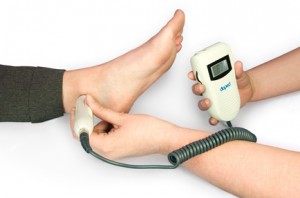
People with diabetes are at a higher risk of complications to the feet. This is due to circulation damage (peripheral vascular disease) and nerve damage (peripheral neuropathy).
Blood flow and nerve related problems can commonly start first in the feet. This is why podiatry is important in the management of your diabetes. However these risks can be minimised with you controlling your blood glucose levels, exercising, eating a balanced diet and taking good care of your feet.
How can a podiatrist help?

- Podiatrists play a vital role in managing your diabetes in a number of ways:
- Diabetes education
- Monitoring your blood circulation and nerve supply
- Providing general treatment care (corns, callous and cutting toenails)
- Footwear advice
- How to provide safe self-care for your feet
https://www.diabetesaustralia.com.au/living-with-diabetes/mind–body/diabetes–your-feet/
Potential foot complications?
Peripheral Vascular Disease (circulation damage)
This results in reduced blood flow to your feet, affecting your body’s ability to heal wounds, fight infections and to keep your feet healthy.
Peripheral Neuropathy (nerve damage)
People who have damaged nerves may not be able to feel injuries or infections to their feet.
Calluses
Calluses can be a common problem in people with diabetes as a result of higher pressure areas in the feet.
Dry Skin
Diabetes can have an effect on the oil glands in your feet making the skin very dry. The nerves that control your oil glands stop your glands from producing enough oil for your skin.
Ulcers
Ulcers can occur either due to poor blood supply or reduced nerve sensation. Ulcers usually occur in places of high pressure such as on the ball of your foot, heels or on your toes. It is important to know if your ulcer does not hurt it should still be treated seriously.
Neurological and vascular Assessment
People with diabetes need a neurological and vascular assessment every 12 months or more frequently. A vascular assessment investigates the blood flow to your feet by the use of a Doppler ultrasound. Your podiatrist will also assess the overall health of your feet by looking at your skin and nails. The neurological assessment tests the health of the nerves in your feet by doing a touch test assessment and using a tuning fork. This allows us to understand the level of sensation and where you have lost sensation in your feet.
